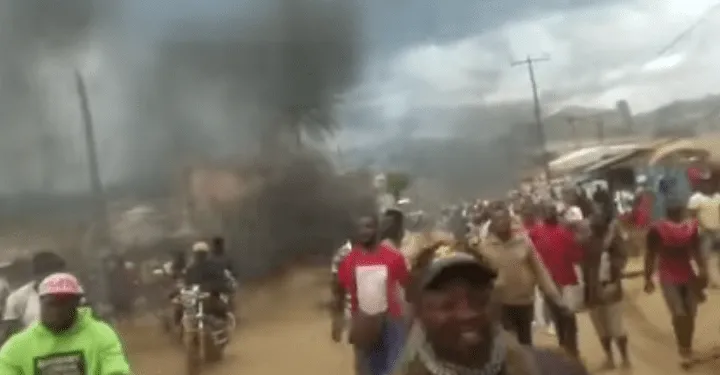At least two persons have been killed today in Bamenda, capital of Cameroon’s North West region.
Protesters took to the streets to protest the killing of a young girl by a security officer earlier this afternoon but met with more violence.
Security forces opened fire after civilians mounted road barricades as they decried brutality and constant harassment by security forces.
At least one was injured and another was rushed to hospital. At the moment, relative calm has returned to the town, but residents are yet to settle.
Reports say buses meant to leave the town for Yaounde, Douala, and other parts of the country this evening returned to their parks, for fear of the unknown.
Another one bites the dust
Today’s protests stemmed from the death of a little girl on her way back from school. The kid identified as Tataw Brandy sources say was killed after a security officer tried shooting at a car close to a control point.
The officer and his colleagues are said to have been on patrol when they tried stopping a car transporting chairs, a usual habit that is known to ‘fetch’ them money from drivers. The driver of the car, not willing to comply, is said to have sped past the officers.
One is said to have opened fire at the car, killing the child who was passing by, in the process. Other unconfirmed sources however say the kid, frightened by the gunshots, fell into a gutter and hit her head, losing consciousness.
She would later be pronounced dead upon arrival at the hospital.
The officers on their part, took to their heels, presumably borrowing a leaf from a similar incident in Buea 29 days ago that saw a Gendarme officer lynched for shooting a kid.
Nowhere is safe
The mother to the kid killed today in Bamenda, it has been revealed, is a petit trader who left Mom, a village in the North West region, due to the armed conflict.
Arriving Bamenda, she is said to have taken up selling sugarcane just to make ends meet and fend for her family.
However, it turned out nowhere in the Anglophone regions seemed safe, as she lost her daughter in the same town she believed would act as a haven for them.
Images on social media showed the lady visibly distraught and filled with grief. She and her family are yet to provide any official reaction to the situation at hand.
Investigation opened: same old story?
Reacting to the death of the schoolgirl, North West governor, Adolphe Lele L’Afrique said no action can be taken without first ascertaining what exactly transpired.
Investigations, the official said, are going on to confirm the real reason behind the kid’s demise.
“The author of the gunshot – the policeman,” he stated, has already been remanded into custody.”
“After the investigation, he would be strongly sanctioned if it is confirmed after the autopsy that it is his gunshot that has killed that young girl…,” he added.
The head of State, President Paul Biya, governor Lele said, has extended words of condolences to the bereaved families.
Many however have since expressed frustration at the governor’s remarks, noting that like many others in the past, little or nothing would be done.
It should be recalled that to date, perpetrators of the Ngarbuh massacre of February 14, 2020, that left some 14 kids and a pregnant lady dead are yet to be sanctioned.
Several other incidents have also ended with promises of investigation, including the torture of a young man by security officers on February 11 in Ndu, North West Region, and most recently, the shooting to death of another schoolgirl by a Gendarme officer in Buea.
In a release later today, the Delegate General for National Security, Martin Mbarga Nguele spelled it out clearly that the kid was killed by the police officer’s bullet. The officer, he stated, had been trying to shoot at a van escaping from their control post when the bullet ricocheted and killed the girl.
The bigger picture
Today’s deaths and chaos in Bamenda, some argue, are a tiny demonstration of the woes residents of the two English-speaking regions of Cameroon have been made to go through on a daily basis.
Since the zone was militarised as the government sought to combat armed separatists clamoring for their own state, thousands have been killed and hundreds of thousands displaced.
Residents have often decried brutality, extortion and violence meted on them by these security forces, but authorities remain mute.
Failure to reach common ground with separatist faction and the government’s resolve to depend more on the army, have not made matters any easier.
Several atrocities including torture, unlawful arrests, kidnapping, murder, and razing of entire villages continue to animate the scene as the world looks on.



